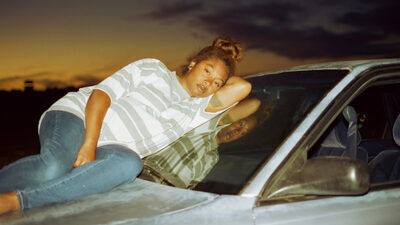Still, there are a couple of places where Black girls can find relatable, nuanced, and thoughtful stories. They exist in the indie sphere or on television. Two incredible chapters in Black girlhood canon, for instance, debuted this year: Savanah Leaf’s “Earth Mama” and Prime Video’s “Gen V,” a spinoff of the platform’s popular series “The Boys.” Both utilize horror aspects to depict the fear of a changing body and the consequences of exiting one stage and entering another. Set in the Bay Area, Leaf’s “Earth Mama” follows Gia (Tia Nomore), a young, single mother, presently pregnant, working to regain custody of her children from foster care. In “Earth Mama,” Leaf showcases beautifully haunting, surreal cutaways to montages of Gia’s pregnant body, her belly rolling and stretching in tandem with her fears and hesitancy as a young mother. The film is rife with love and resilience coexisting with harsh realities of Black girlhood: judgment from peers, underfunded social resources, and the misogynoir that comes with being a young Black mother.

“Gen V” follows young superheroes training their powers and building their brands at a university for supes. It contains all the usual college-age maturation themes, like newfound independence, partying, and sex, and combines it with the precarious implications of supernatural abilities and recklessness. The series’ Marie Moreau (Jaz Sinclair) doesn’t come into her powers until she gets her first period. It’s an event marked not only by blood, but crippling loss, fear, and newfound identity, and at the moment, she doesn’t understand what’s happening. Locked in the bathroom, quivering with terror and trying to grasp for clarity, her body takes over, forcefully commanding its authority and thrusting her into the next stage against her will. While Marie’s losses are tangible, they’re also contextually significant to the tyrannical takeover of girlhood and the task of learning to adapt into the woman you must become.
Though these incredible examples of Black girlhood are important, both “Earth Mama” and “Gen V” are marketed and created for adult audiences. What is left is a glaring gap between representation targeting Black children and media aimed at older teens and adults. Where are the films for girls too old to keep “The Princess and the Frog” in rotation, and too young to appreciate the nuance and social commentary of “Earth Mama” or witness the raunch-fest that is “Gen V?” When it comes to finding diverse coming-of-age stories for young teens, you often have to dig another level down, past theater releases or big production companies and into the soil of less marketed, straight-to-digital cinema.
Sumber: www.rogerebert.com
 Skip to content
Skip to content






